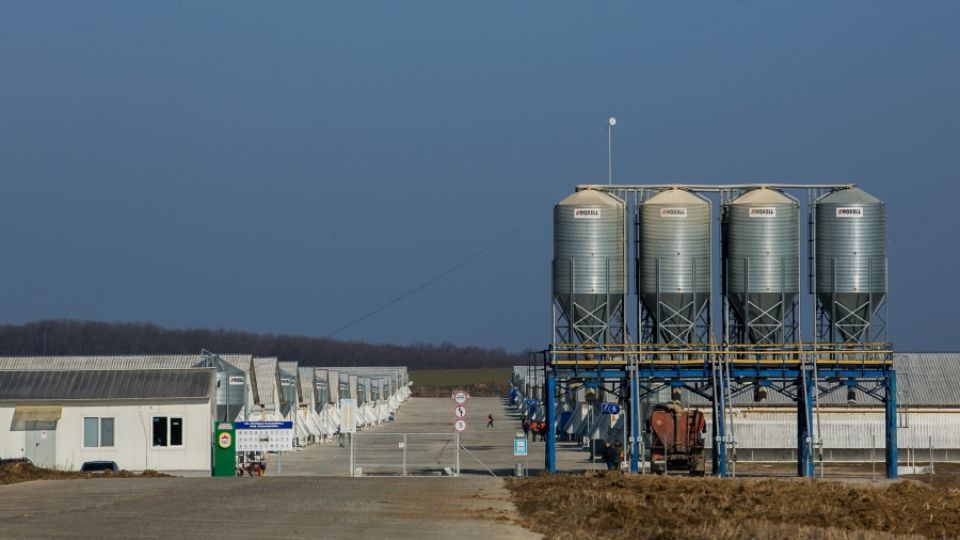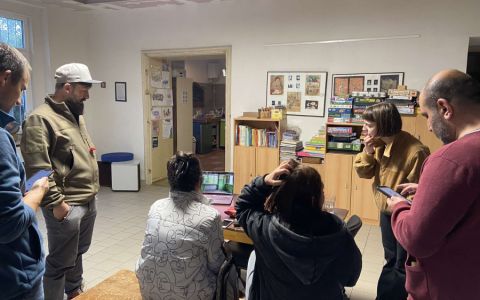Ukraine is well known for it's fertile land and big agricultural sector. It is not a coincidence that Ukraine is sometimes being called "a granary of Europe." Unfortunately, the present massive production and consumption of goods and even the agriculture brings many unpredicted and harmful consequences. The agricultural sector does not mean only production of grain or fruits, but it also includes the industrial meat production. It is not a secret that intensive animal farming is one of the most highly polluting industries worldwide. In Ukraine, the problem investigated by Arnika together with Kiev based NGO Ekodiya, is connected with intensive poultry farming. On the following lines, you can find a report from the "facts finding mission" (FFM) to Vinnytsia region. In this region, there are some of the most harmful poultry complexes in Europe. The problem we have discovered is not only about the environment, but the issues even about encompass serious violation of human rights.
In Ukraine, most of the market with chicken meat and poultry products is operated by the conglomerate "Mironivsky Hliboprodukt" (MHP) which is owned by the oligarch Yuriy Kosyuk. The company produces over one million tons of chicken meat per year, and approximately one fourth of it goes on export. The MHP agriculture holding consists of every part of the production cycle – fields and grain production (Zernoproduct), fodder production, incubator, rearing facilities - chicken farms (brigades), slaughter house, meat processing and bone meal production plant, waste water treatment facilities (Vinnytsia poultry farm), construction of the brigades (Vinnytsia Broiler) etc. Such a structure enables the company to cover the whole process of meat production with its own resources. Such an advantage was enabled by a big loans from international financial institutions such as the European Bank for Reconstruction and Development (EBRD).
Cheap loans for big profits
To have a complete background of the situation, it is important to mention the land market situation in Ukraine, which helped for such a massive expansion of one private company. There is no land market established in Ukraine – MHP is concluding contracts on leasing of the fields for construction for 49 years. Basically, they are purchasing the land. Payment is about 180,000 UAH (about 6,000 Euros) for standard piece of land (ca 2 hectares) for the whole period of the contract paid in advance. During the privatization of collective farms, practically each family or person obtained from the state approximately 2 hectares of the field (share in kolkhoz). Still about 10 million hectares are owned by the state as the agricultural land reserve, and people can ask for it. When MHP needs the land, it has to go to the villagers and convince them for each brigade or facility. People who need the money more are creating pressure on the others in the village, who may be not that agreeable with the observed practices of the company. Another issue is that MHP actually became one of the biggest employers in the region, providing social benefits to its workers. For many people, working in MHP may be the easiest way to secure a stable job. On the other hand, many reported unsatisfactory conditions in chicken farms both for the workers and animals. Also, we have heard complaints about the low level of income.
Since 2010, there have been 12 chicken brigades constructed around the town of Ladyzhyn in the Vinnytsia region; three other brigades are being constructed, and six are under preparation. Each separate MHP's chicken farm (brigade) includes 38 houses in this region. It is believed that each brigade houses more than one million chickens.
Tough practices in chicken region
On the first day of the mission, the team consisting of members from Ekodiya and Arnika, visited many problematic sites, spoke both with local activists and representatives of local administration. In the end – after a serious clash with a private security – they met the head of one of the main MHP's subsidies. At the beginning, after a visit to two of the operating brigades and unsuccessfull attempts to speak with its employees, we participated at the public meeting in Mankivka village. There is an intention of the company to bulid a new brigade close to river Bug,which flows nearby the village. The field that is being considered for construction is very close to the public resort and beaches ‘Dubky.’ Moreover, it is natural, picturesque, and unique ravine. However, the current land-owners still do not want to lease the lands to MHP. A report from Mykhailivka Village Council Chairman was presented at the meeting, but the issues of the new brigade in the fields close to river Bug were not discussed.
After the meeting, we spoke with many local activists about the situation in the region. There are many stories of threats to local activists, cases of their relatives being fired from jobs at the company'ssubsidiaries, stalking of activists leaders, and there are even cases of serious physical violence and beatings against activists by hired security services. Right after our visit with one local woman, whose house suffers from the huge volume traffic of trucks with chicken, fodder, and manure, she received a call with threats persuading her to not to speak with us again. An FFM team submitted the complaint to the public relation officer of MHP in Kiev immediately with CC to the international banks. Such stories are not unusual; we have witnessed the agressive practices and abuse of power is still a common practice.
In the afternoon, we visited a new construction site for a poultry brigade close to the Vasylivka village. We assumed that the constructed brigade has no building permissions including missing Environmental Impact Assessment (EIA). There was no public information about the release of such documents. We went on the site, and there were no signs marking a construction site or a private property. After short time, the security of Vinnytskiy Broiler arrived and started to threaten us and the local activists who were accompanying us. Following this, we called the police and demanded the missing documents for construction. The police wrote a protocol about the clash with the security, and the security proposed to visit the office of Vinnytskiy Broiler to see documents on building preparation. So after the tough moments on the site, we were invited to sit in on a meeting with the CEO of the subsidy Igor Leshchenko where we received documents of preliminary EIA, the permits to remove soil, and notification about preparatory works for overview. We were not allowed to photocopy the documents. According to international standards, it is not possible to do preparatory works without EIA. This visit that did not have a pleasant tone, would not have happened without our call to MHP's headquarters in Kiev which was made on-site. Later, the aggresive behaviour of the security changed. In a moment, it was obvious that our presence in the region may bring attention.
Education and knowledge sharing as an activist tool
The next day, we organised a seminar and a workshop for local activists in Ladyzhyn. Members of Arnika and Ekodiya held lectures on public participation and the legal aspects regarding access to information. We have shown some example cases from the Czech republic where the civil society successfully participated and demanded its rights. The second block of the event was focused on networking with the activists – the participants shared their experiences with the struggles against poultry brigades and learned about cases in different villages. Such networking of activists in the region dealing with the same problem is one of the most important parts of the activities. Suprisingly, local activism in ukrainian countryside is mostly done by older citizens -- at least in the case of MHP. There are no signs of youth activism in the region . Perhaps, the reason for this fact is that many young people leave the region for better job, work for the company, or simply do not care about the issue.
Many sites, similar pollution, same practices
Probably the biggest problem is caused by intensive poultry farming in the region is a massive traffic. This traffic leads to the serious damage villager houses. Excluding the smell and environmental pollution, the traffic is the most visible consequence of the chicken business in Vinnytsia. We spoke with many villagers whose houses suffer from cracks caused by the vibrations of the heavy trucks passing by. In the village of Olyanitsya, all the houses are already damaged from the heavy traffic according to previous research. Locals reported traffic jams in a village with only a few hundred residents. Trucks with chicken, concrete mixers, waste water tanks, trailers, and hundreds of cars daily plague the village. Although there is a speed reduction (40 km/h), drivers do not respect it. Many people in the village installed new plastic windows to protect themselves from noise, but other measures were not implemented.
The local administration is in tough position. MHP brings jobs and investments to a poor region. Yet, the company divides the society and transforms the land of a small and diverse agricultural region into a big slaughter machine. The people have limited access to information, and the public and private sector seems quite interconnected in several cases. There are manure and dumping sites spreaded accross the region. This endangers the local water streams and soil with aggressive nitrates. In Chetvertinyvka, the villagers showed us the waste landfill where MHP’s fodder plant puts their waste. We found packaging from antibiotics and food additives.
We did not expect the problems caused by intensive industrial poultry farming to be so big and complex. From the ecological perspective to the human rights perspective, the case we discovered on our first mission to Ukraine left us in shock. Vinnytsia is one of 4 regions in Ukraine where MHP operates. Together with the company's intentions on further expansion to the EU, we figured bigger actions must be taken. There must be international pressure to change the practices . Therefore, we are keen to join our colleagues from Ekodiya and Bankwatch. They have been dealing with the problem for a few years already. Arnika will try to join their efforts to help the locals who have limited tools to improve the situation.
Photogallery from the mission>>>
Short documentary about the case of Olyanitsya>>>
Further readings:
Bankwatch's report from Vinnytsia region from 2015>>>
Bankwatch's analysis of the EBRD's investments to MHP>>>
Bankwatch's report on beatings of anti-MHP activists>>>







